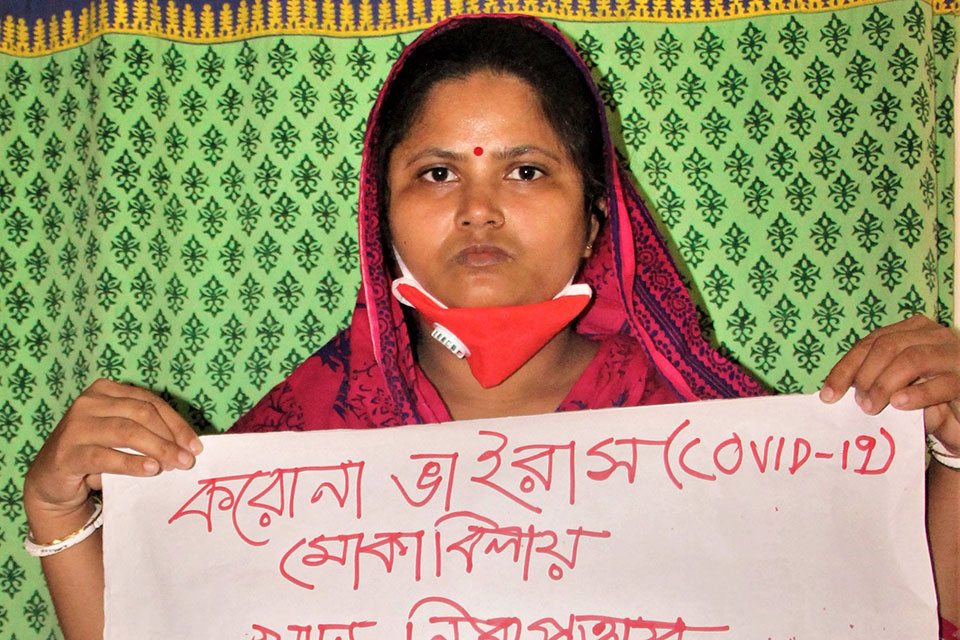Far from the spotlight, women workers are among the hardest hit by COVID-19 in Bangladesh
Date:

As of 14 April 2020, there were 1,012 confirmed cases in Bangladesh. With numbers mounting daily, COVID-19 is already having significant and disproportionate effects on Bangladeshi women.
While the new coronavirus infection spares no one, its socio-economic impact exposes the long-standing discrimination that women and girls face at home and in the economy. The poorest are hit hardest, including migrant and domestic workers.
In 2019, over 700,000 Bangladeshi workers migrated overseas, through the Bureau of Manpower, Employment and Training (BMET) and around 100,000 of them were women. As countries around the world implement lockdown measures to curb the spread of COVID-19, many Bangladeshi migrants are back home with no income.
Julekha Begum, from the district of Bogura, 196 Kilometres from the capital city Dhaka, is one of them. She returned from Saudi Arabia at the end of February and doesn’t know when she can go back to work.
Along with the loss of livelihoods, returnees are also experiencing social stigma as a result of the coronavirus outbreak and being shunned by their community.
Since her return, Begum has been confined to her home even before the government-imposed lockdown. “I have to survive and live my life as a regular human being. I need to go back overseas again. But right now, I cannot even get out of my home because of social pressure,” she said.
“When I got back here, my health condition was good. Still, the neighbours are suspicious about me, they think I will spread the virus. I don’t know when this will end and when will I be able to move freely.”
Globally, and in Bangladesh, majority of domestic workers are also women. To stop community transmission of COVID-19, Bangladeshi families who had domestic workers have also let them go. For many domestic workers, this translates to no income and no food.
Rani Begum, from Mohammadpur, Dhaka, is a case in point.
Begum, one of the millions of women in the informal economy, works as a part-time domestic worker in three households and her husband is a rickshaw puller. She relies on her wage to pay rent— BDT 6000 (USD 71) every month. Since the COVID-19 outbreak, they have no work, and many mouths to feed.
“Today, I cooked only rice and vegetables for my family. I cannot manage fish or any other food,” she said.
The virus does and will discriminate, unless social protection measures reach women workers like Rani and Julekha.
Nearly 60 per cent of women around the world work in the informal economy, with low wages and less savings or safety nets. As global markets crash and millions of jobs disappear, these women are at an even higher risk of falling into poverty. The COVID-19 outbreak is already having a significant impact on small businesses in Bangladesh, with shops, restaurants and beauty salons closed, and limited number of restaurants doing delivery.

Namira Hossain is the founder of Cookups, an online platform that connects home-based cooks to diners looking for tasty, home-made meals in Dhaka. There are more than 16,000 registered cooks on this platform, most of whom are women.
Since the coronavirus outbreak, Hossain had to shut down her business as her delivery staff felt unsafe to deliver food. As a result, many of her predominantly women cooks, who are also micro-entrepreneurs, have lost their only source of income. “Every day that we remain shut, hurts us greatly,” she said.
Although Hossain plans to reopen her business as soon as lockdown measures are lifted, she fears continued impact with difficulty in procuring the right ingredients, as most markets are closed, and she may not get enough people to make deliveries.
She stresses on the importance of support from the government for women-led small businesses: “We need support in logistics, as well as for covering medical expenses of our staff if they get infected. Measures such as cash grants and tax cuts will really help us.”
On 5April, the Prime Minister Sheikh Hasina announced a TK 72,500 Crore (approximately USD 8.57 billion) stimulus package for the Bangladesh economy. The package includes increasing public expenditure; increasing fiscal packages; expanding social security programmes; and increasing money supply.
Shoko Ishikawa, UN Women Bangladesh Country Representative, says, “We must ensure that the stimulus package and the social protection measures being introduced will reach women like Julekha and Rani in the informal sector and women micro-entrepreneurs like Namira and her cooks.”
“We have set up a gender monitoring network of civil society organizations to whom we reach out at regular intervals to gather information on the challenges that women are facing so that we can channel their voices to policy makers.”
UN Women has also engaged enterprises like Cookups in relief services. Together with Cookups, and Bangladesh Nari Sramik Kendra (Bangladesh Women’s Workers’ Centre), an organization supporting migrant and domestic workers, UN Women used crowdfunding to raise funds and distributed groceries and cooked meals for 300 migrant returnee women and domestic workers.